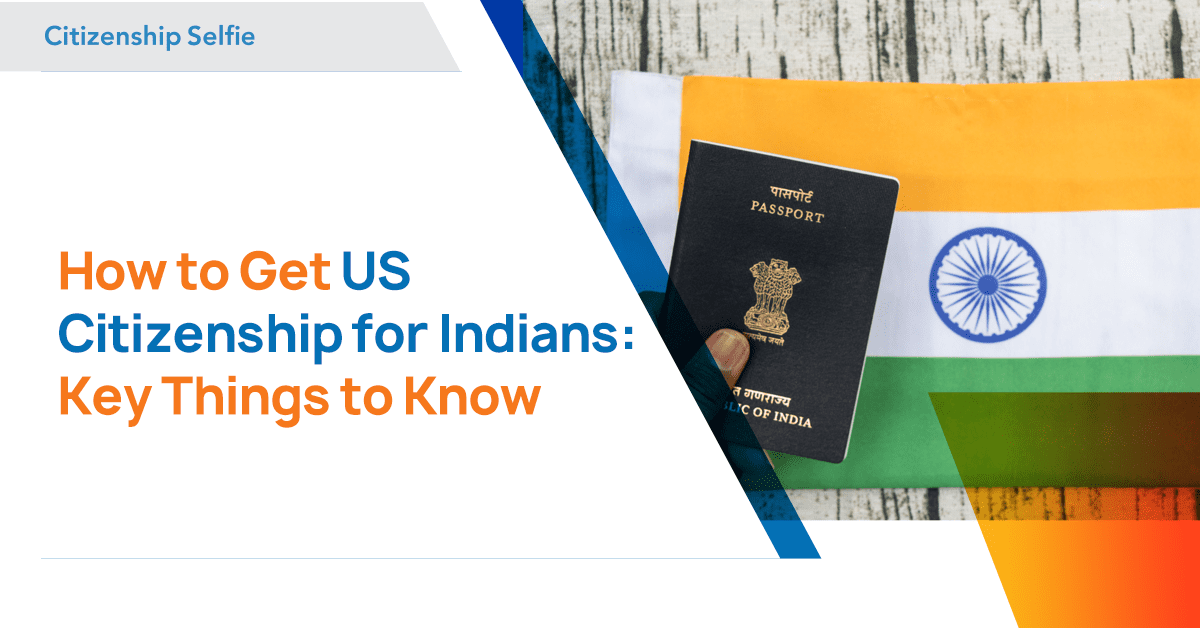The United States of America has long been a land of dreams, beckoning countless Indians to its shores. From opportunities in higher education to a chance at a higher standard of living, the U.S. offers a myriad of possibilities. Many Indians venture here on work visas, seizing the promise of a brighter future. However, these visas often have a limited lifespan, typically expiring after five years. When your visa’s clock is ticking, you may find yourself questioning the idea of returning to India. If the U.S. has become your home, the path to permanence often leads to U.S. citizenship.
This comprehensive guide answers crucial questions, such as how to obtain U.S. citizenship for Indians, what the associated costs are, and how long the process takes. It’s your road map to understanding the intricacies of U.S. citizenship applications and eligibility, ensuring your dream of becoming a U.S. citizen is within reach.
Understanding US Citizenship for Indians
The United States presents a wealth of opportunities for skilled and educated Indians. With its promise of freedom, a multicultural environment, and competitive compensation, it’s an enticing prospect. However, the journey to U.S. citizenship can be complex due to the nation’s ever-evolving immigration policies, which often reflect the current government’s stance on foreign nationals.
Key Privileges and Benefits of US Citizenship for Indians
Becoming a U.S. citizen brings many advantages compared to being a green card holder. These include:
- Voting Rights: While green card holders may vote in certain municipal elections, U.S. citizens have the privilege of casting their votes in national elections, shaping the country’s future.
- Eligibility for Public Office: U.S. citizens, through naturalization, can run for various offices in the United States.
- Immigration Simplification: As a U.S. citizen, you no longer need to renew your green card, navigate immigration forms, or pay their associated fees at regular intervals.
- Government Job Opportunities: Numerous well-paying, prestigious government jobs are open exclusively to U.S. citizens.
- Citizenship for Family: With a U.S. certificate of naturalization, you can sponsor your parents, siblings, and children for U.S. citizenship. Your child, even if born outside the U.S., will automatically be a U.S. citizen.
- Protection Against Deportation: A U.S. citizen cannot be deported like an immigrant, barring rare instances of fraudulent naturalization applications.
- Global Mobility: U.S. citizens hold a passport that grants them visa-free access to over 180 countries and territories, simplifying international travel.
Touching on the Naturalization Process for Indians
Naturalization is the process through which you can convert your U.S. green card into full citizenship. Not all immigrants are eligible for naturalization. Generally, it is available to individuals who have held a green card for five years or more (or three years for those married to U.S. citizens) and meet specific military service requirements.
Eligibility Criteria for Indians Applying for US Citizenship
Here’s a detailed look at the eligibility U.S. citizenship requirements for Indians:
Permanent Residency Requirements:
- You must be at least 18 years old when applying for U.S. citizenship (Form N-400).
- Ability to speak, read, and write basic English.
- Legal residency in the U.S. for a minimum of five years.
- You must take an oath of allegiance to the United States.
- Demonstrate a sincere commitment to the principles and ideals of the U.S. Constitution.
- If you are a student financially dependent on your parents, you must apply for naturalization in the state where you study or where your family resides.
- Those who have served in the U.S. military for a year or less during peacetime can apply for U.S. citizenship with certain conditions.
Physical Presence and Residence Requirements:
- A minimum of 30 months’ physical presence in the U.S. within the five years leading up to your U.S. citizenship application.
- Reside for at least three months in the state or USCIS district having jurisdiction over your place of residence.
Continuous Residence and Absences from the U.S.:
You must have resided continuously in the U.S. for at least five years before applying for U.S. citizenship.
Good Moral Character and Criminal Background Checks:
- Proving that you have demonstrated good moral character during the last five years in the U.S. is vital for U.S. citizenship.
- Background checks are conducted to assess your criminal history. Having a criminal record may result in application rejection. So, maintaining a clean record is essential.
Step-by-Step Guide to Applying for US Citizenship
Here’s a comprehensive guide on how to apply for U.S. citizenship as an Indian:
Step A: Apply for Naturalization
Initiate the naturalization process by filing Form N-400, Application for Naturalization, and paying the required fees. You can opt for either an online or paper application, with the latter being necessary in certain cases. Applying online, you can create an account with the U.S. Citizenship and Naturalization Services (USCIS). You may file your application 90 days before your green card’s expiration date, even though you’ll have to wait for the card’s full duration for U.S. citizenship.
Step B: Get an Appointment for Biometrics
After submitting your application, schedule an appointment for biometrics, where your fingerprints will be recorded. This step typically occurs about a month after application submission.
Step C: Citizenship Interview and Exam
The citizenship interview usually takes place around ten months after filing your application, with the exact timing varying by the local USCIS office managing your case. During this interview, your information will be verified at your nearest USCIS office. Applicants from abroad can undergo interviews at their country’s embassy or consulate. You must also pass a two-part written examination unless exempted. Study materials will be provided by the USCIS.
Step D: Oath of Allegiance
Upon successful interview and examination completion, your application gets approved. The final step involves attending an Oath of Allegiance ceremony, during which your green card is surrendered, and you are presented with a Certificate of Naturalization, completing the U.S. citizenship process.
Documents Required to Apply for US Citizenship
To apply for U.S. citizenship, you will typically need the following documents:
- Identity Proof
- Marriage Certificate (if applicable)
- Marriage Annulment Certificate (if applicable)
- Divorce Decrees (if applicable)
- Death Certificate of Spouse (if applicable)
- Proof of Residence for Permanent Resident Status (If you hold a green card)
- Passport Size Photograph (2 copies)
- Proof of Medical Disability (if applicable)
- Fee Reduction/Waiver Application (if applicable)
- Request for Representation in the Interview (if you want to bring your attorney to the interview)
Estimated Processing Time and Waiting Periods
The entire naturalization process, starting from filing the application and ending with the Oath of Allegiance ceremony, typically spans around 10 to 14 months. The interview is generally scheduled approximately ten months after you file your application. In many cases, the interview and the written examination occur on the same day. If there is a delay, the USCIS has 120 days from the interview date to send a confirmation of your application’s acceptance or rejection. If the oath ceremony isn’t held on the interview date, it will be scheduled within the next 2 to 6 weeks.
Common Challenges in Obtaining American Nationality and How to Overcome Them
Numerous factors could lead to the rejection of your naturalization application. Here are some common reasons and ways to navigate these issues:
- Invalid Green Card: You must possess a valid green card to apply for U.S. citizenship. Immigration authorities will scrutinize your green card for discrepancies or fraud, leading to application rejection. It’s crucial to maintain proper residency and ensure your green card’s authenticity before applying.
- Incomplete Application: An incomplete application form or incorrect information provided at any stage can lead to rejection. Ensuring you have sufficient documentation as evidence for the information provided is essential.
- Criminal Record: Upholding good moral character is essential for U.S. citizenship. Immigration services perform background checks to verify your criminal history. Having a criminal record may result in application rejection. If U.S. citizenship is your goal, it’s important to maintain good character and avoid unlawful activities.
- Two-Part Test: As discussed earlier, passing the interview and the written tests is essential for U.S. citizenship. A reasonable understanding of basic English and knowledge of U.S. history and civics is crucial to passing these exams. Studying the materials provided by the USCIS is advisable to ensure you’re well-prepared.
- Tax Obligations and Child Support: Unresolved tax payments or child support dues can result in application rejection. It’s recommended to clear any outstanding bills or dues before applying for U.S. citizenship.
Rejection of US Citizenship Application
In the event that your U.S. citizenship application is rejected by the USCIS, you will receive a denial letter outlining the reasons for rejection. You have two options: appeal the rejection within 30 days of receiving the information or reapply for citizenship.
Rights and Responsibilities of US Citizens
As a U.S. citizen, you’ll be required to renounce your Indian citizenship. While dual citizenship is not allowed in most countries, certain nations, such as Canada, Australia, and the United Kingdom, permit dual citizenship alongside U.S. citizenship.
Additional responsibilities and privileges include:
- Jury Duty: If summoned to serve on a jury, you are obligated to attend. Whether you end up serving on the jury or not depends on the attorney’s and judge’s decisions.
- Selective Service: U.S. citizens who have lived in the country between the ages of 18 and 25 must register with the Selective Service System and may be called upon for military service.
Final Recap
U.S. citizenship is a cherished dream for many Indians, offering a future rich with job opportunities, superior income potential, high living standards, and advanced healthcare facilities. However, it’s crucial to note that obtaining U.S. citizenship often entails renouncing your Indian citizenship.
At Citizenship Selfie, we’re committed to helping Indians achieve their American dream. Our experienced team provides guidance and support throughout the U.S. citizenship application process. We ensure you have the information and assistance you need to make this journey as smooth as possible. Secure your spot as a U.S. citizen, unlocking a world of new opportunities and possibilities. The dream of becoming an American citizen is now well within your grasp.






